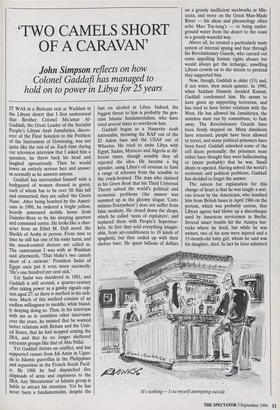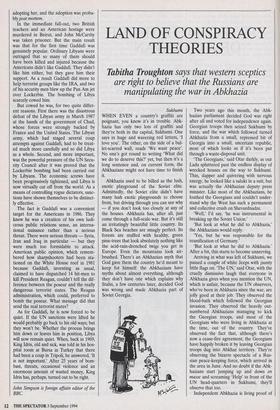'TWO CAMELS SHORT OF A CARAVAN'
John Simpson reflects on how Colonel Gaddafi has managed to hold on to power in Libya for 25 years
IT WAS in a Bedouin tent at Waddam in the Libyan desert that I first understood that Brother Colonel Mu'amar Al- Gaddafi, the Great Leader of the Socialist People's Libyan Arab Jamahiriya, discov- erer of the Final Solution to the Problem of the Instrument of Governing, was not quite like the rest of us. Each time during our television interview that I asked him a question, he threw back his head and laughed uproariously. Then he would lower an entirely serious face and answer as normally as he answers anyone.
Gaddafi has surrounded himself with a bodyguard of women dressed in green, each of whom has to be over 5ft 8ins tall and unmarried; they are called 'the Green Nuns'. After being bombed by the Ameri- cans in 1986, he ordered a bright yellow, heavily armoured mobile home from Daimler-Benz to be his sleeping quarters and command centre. He looks like a char- acter from an Ethel M. Dell novel: the Sheikh of Araby in person. From time to time he still has one of his nasty turns, and the mood-control doctors are called in. The cameraman I was with at Waddam said afterwards, 'That bloke's two camels short of a caravan.' President Sadat of Egypt once put it even more succinctly: 'He's one hundred per cent sick.'
Yet Sadat was murdered in 1981, and Gaddafi is still around, a quarter-century after taking power as a gawky signals cap- tain aged 27; so there is method in his sick- ness. Much of this method consists of an endless willingness to meddle, while bland- ly denying doing so. Thus, in his interview with me as in countless other interviews over the years, he insisted that he wanted better relations with Britain and the Unit- ed States, that he had stopped arming the IRA, and that he no longer sheltered extremist groups like that of Abu Nidal. Yet Gaddafi thrives on conflict, and has supported causes from Idi Amin in Ugan- da to Islamic guerrillas in the Philippines and separatists in the French South Pacif- ic. By 1988 he had dispatched five Shiploads of arms and explosives to the IRA. Any 'liberationist' or Islamic group is liable to attract his attention. Yet he has never been a fundamentalist, despite the ban on alcohol in Libya. Indeed, the biggest threat to him is probably the gen- uine Islamic fundamentalists, who have tried several times to overthrow him.
Gaddafi began as a Nasserite Arab nationalist, throwing the RAF out of the El Adem base and the USAF out of Wheelus. He tried to unite Libya with Egypt, Sudan, Morocco and Algeria at dif- ferent times, though sensibly they all rejected the idea. He became a big spender, using Libya's oil revenue to fund a range of schemes from the sensible to the crack-brained. The man who claimed in his Green Book that his Third Universal Theory solved the world's political and economic problems (the answer was summed up in the gloomy slogan 'Com- mittees Everywhere') does not suffer from false modesty. He closed down the shops, which he called 'nests of exploiters', and replaced them with People's Supermar- kets. At first they sold everything imagin- able, from air-conditioners to 18 kinds of spaghetti, but they ended up with their shelves bare. He spent billions of dollars on a grossly inefficient steelworks at Mis- urata, and more on the Great Man-Made River — his ideas and phraseology often echo Mao Tse-tung's — to bring under- ground water from the desert to the coast in a grossly wasteful way.
Above all, he created a particularly nasty system of internal spying and fear through his Revolutionary Guards, who carried out some appalling human rights abuses but would always get the lethargic, unwilling Libyan crowds on to the streets to pretend they supported him.
Now, though, Gaddafi is older (53) and, if not wiser, then much quieter. In 1990, when Saddam Hussein invaded Kuwait, Gaddafi condemned him. He seems to have given up supporting terrorism, and has tried to have better relations with the West. He has allowed his Jamahiriya, the stateless state run by committees, to fade away. The Revolutionary Guards have been firmly stepped on. Many dissidents have returned, people have been allowed to travel, and many political prisoners have been freed. Gaddafi unlocked some of the cell doors personally; the prisoners must either have thought they were hallucinating or (more probably) that he was. Small shops re-opened. Having solved the world's economic and political problems, Gaddafi has decided to forget the answer.
The saloon bar explanation for this change of heart is that he was taught a seri- ous lesson by the Americans, who bombed him from British bases in April 1986 on the pretext, which was probably untrue, that Libyan agents had blown up a discotheque used by American servicemen in Berlin. Several smart bombs hit the Aziziya bar- racks where he lived, but while he was unhurt, two of his sons were injured and a 15-month-old baby girl, whom he said was his daughter, died. In fact he later admitted 'It's nothing — I cut myself attempting suicide.' adopting her, and the adoption was proba- bly post mortem.
In the immediate fall-out, two British teachers and an American hostage were murdered in Beirut, and John McCarthy was taken prisoner. But the main result was that for the first time Gaddafi was genuinely popular. Ordinary Libyans were outraged that so many of them should have been killed and injured because the Americans didn't like Gaddafi. They didn't like him either, but they gave him their support. As a result Gaddafi did more to help terrorist gaups like the IRA, and two of his security men blew up the Pan Am jet over Lockerbie. The bombing of Libya scarcely cowed him.
But cowed he was, for two quite differ- ent reasons. First there was the disastrous defeat of the Libyan army in March 1987 at the hands of the government of Chad, whose forces were strongly backed by France and the United States. The Libyan army, which had staged several coup attempts against Gaddafi, had to be treat- ed much more carefully and so did Libya as a whole. Second, and more important, was the powerful pressure of the UN Secu- rity Council after it was proved that the Lockerbie bombing had been carried out by Libyans. The economic screws have been progressively tightened, and Libya is now virtually cut off from the world. As a means of controlling rogue dictators, sanc- tions have shown themselves to be distinct- ly effective.
The fact is Gaddafi was a convenient target for the Americans in 1986. They knew he was a creation of his own ludi- crous public relations sense, an interna- tional nuisance rather than a serious threat. There were serious threats — Syria, Iran and Iraq in particular — but they were much too formidable to attack. American public opinion, which remem- bered how sharpshooters had been sta- tioned on the White House roof in 1981 because Gaddafi, inventing as usual, claimed to have dispatched 14 hit-men to kill President Reagan, couldn't tell the dif- ference between the poseur and the really dangerous terrorist states. The Reagan administration, which could, preferred to bomb the poseur. What message did that send the real terrorist states?
As for Gaddafi, he is now forced to be quiet. If the UN sanctions were lifted he would probably go back to his old ways; but they won't be. Whether the process brings him down or leaves him in position, Libya will now remain quiet. When, back in 1969, King Idris, old and sick, was told in his hos- pital room at Bursa in Turkey that there had been a coup in Tripoli, he answered, 'It is not important.' After 25 years of bom- bast, threats, occasional violence and an enormous amount of wasted money, King Idris has, perhaps, turned out to be right.
John Simpson is foreign affairs editor of the BBC.



























































 Previous page
Previous page